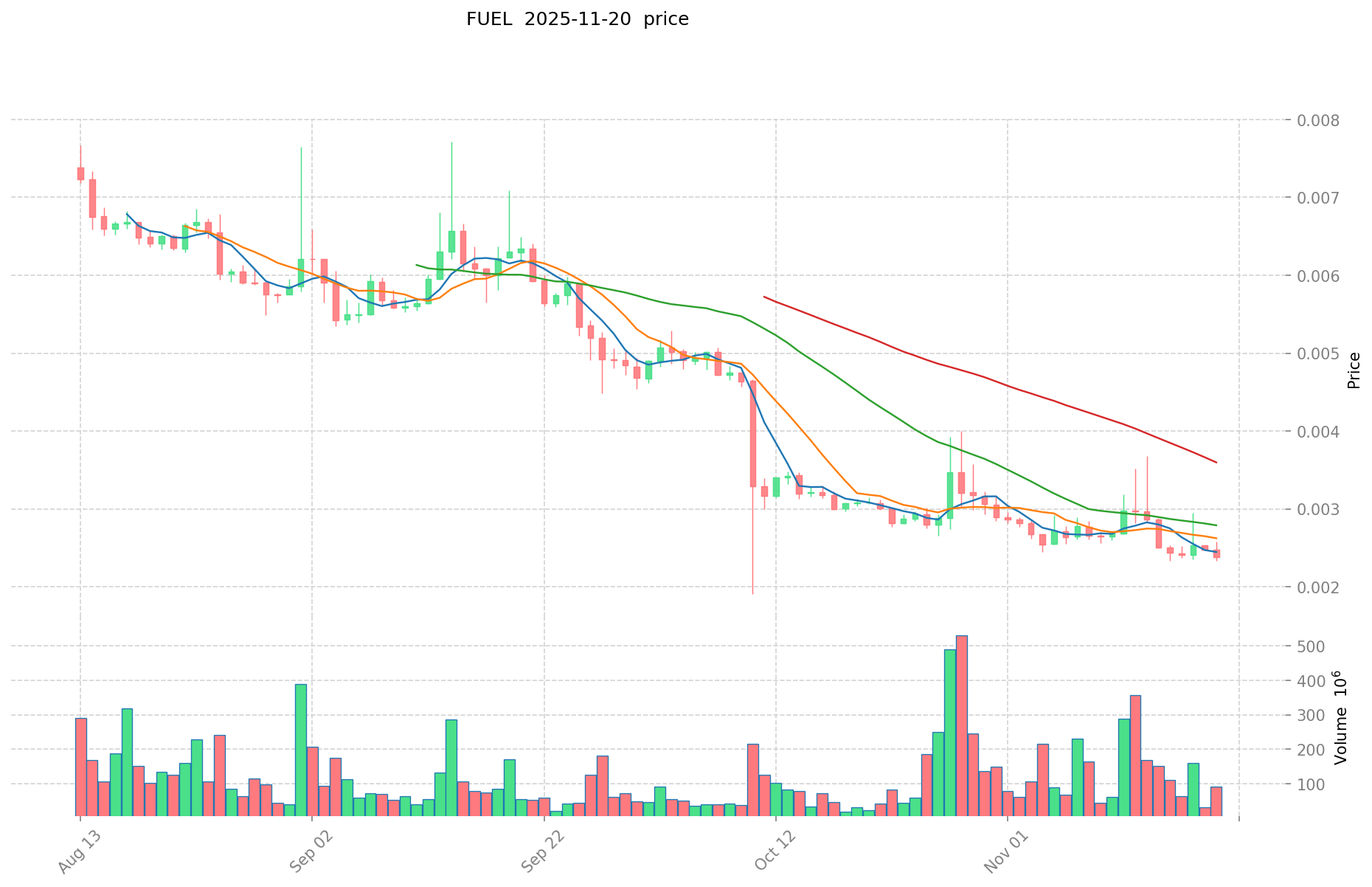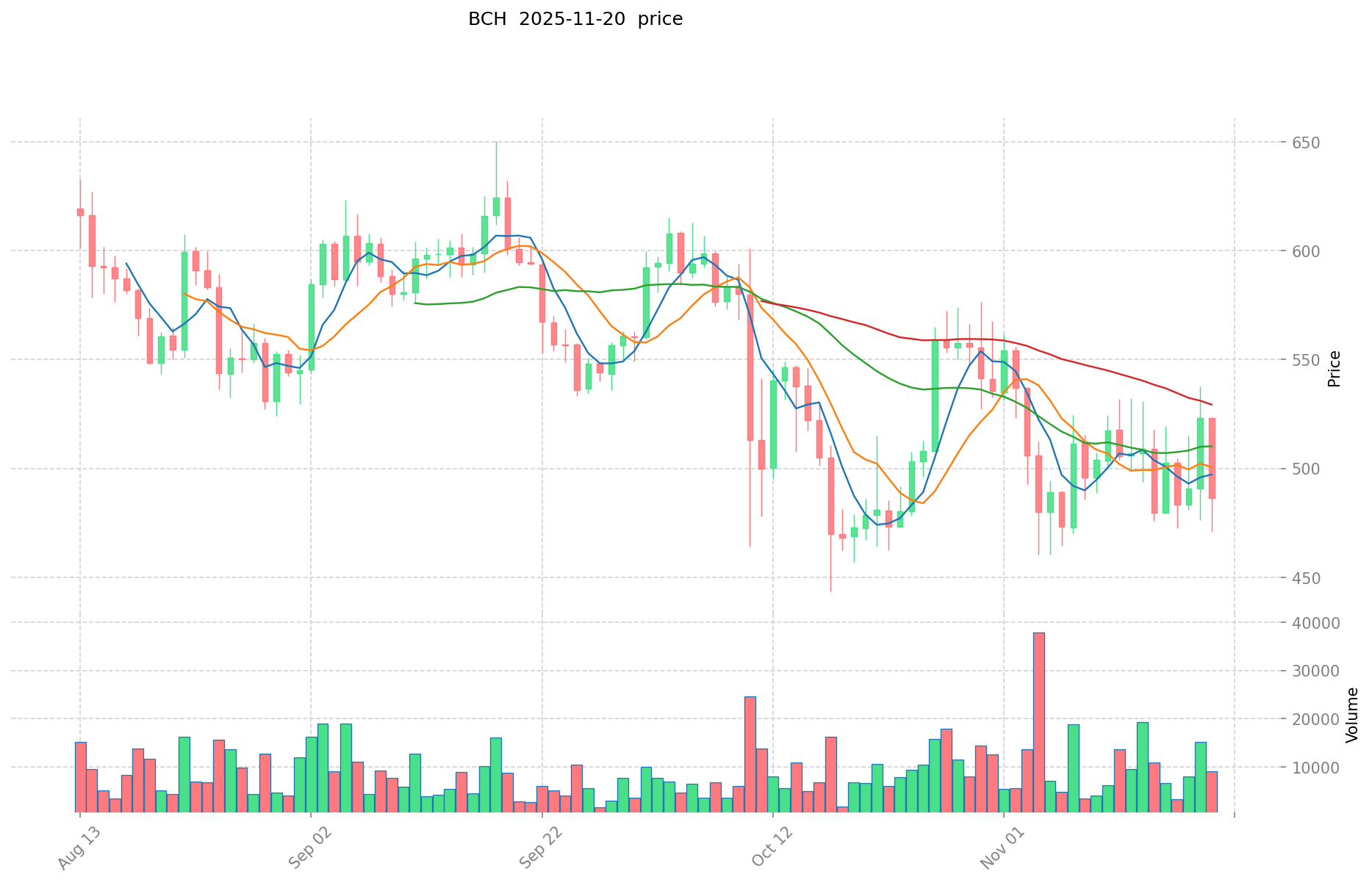FUEL vs BCH: Comparing Two Cryptocurrency Projects for Long-Term Investment Potential
This article offers a comprehensive comparison of FUEL and BCH, highlighting their differences in market cap, application scenarios, and price performance. It analyzes historical price trends, supply mechanisms, institutional adoption, and technological ecosystems, providing investors with insights into long-term investment strategies for each cryptocurrency. Key questions addressed include price predictions, core factors affecting value, potential risks, and investment advice tailored for new, experienced, and institutional investors. With a focus on Ethereum ecosystem growth for FUEL and BCH's established payment infrastructure, readers gain actionable insights to make informed investment decisions.Introduction: FUEL vs BCH Investment Comparison
In the cryptocurrency market, FUEL vs BCH comparison has always been a topic that investors can't avoid. The two not only have significant differences in market cap ranking, application scenarios, and price performance, but also represent different crypto asset positioning.
FUEL (FUEL): Launched in 2023, it has gained market recognition for its innovative features in the Ethereum ecosystem.
Bitcoin Cash (BCH): Since its inception in 2017, it has been hailed as a "peer-to-peer electronic cash system", and is one of the cryptocurrencies with the highest global transaction volume and market capitalization.
This article will comprehensively analyze the investment value comparison between FUEL and BCH, focusing on historical price trends, supply mechanisms, institutional adoption, technological ecosystems, and future predictions, and attempt to answer the question that investors care most about:
"Which is the better buy right now?"
I. Price History Comparison and Current Market Status
FUEL (Coin A) and BCH (Coin B) Historical Price Trends
- 2025: FUEL reached its all-time high of $0.021383 on April 16, but later dropped to its all-time low of $0.001902 on October 10.
- 2017: BCH was created through a hard fork from Bitcoin, with an initial price of $555.89 on July 23.
- Comparative analysis: In the recent market cycle, FUEL has experienced significant volatility, dropping from its ATH to near its ATL. BCH, on the other hand, has shown more stability, currently trading at $505.62, which is well above its ATL of $76.93 set in December 2018.
Current Market Situation (2025-11-20)
- FUEL current price: $0.002376
- BCH current price: $505.62
- 24-hour trading volume: FUEL $163,688.11 vs BCH $4,088,161.90
- Market Sentiment Index (Fear & Greed Index): 11 (Extreme Fear)
Click to view real-time prices:
- View FUEL current price Market Price
- View BCH current price Market Price


II. Core Factors Affecting Investment Value of FUEL vs BCH
Supply Mechanism Comparison (Tokenomics)
- FUEL: Total supply of 2.2 billion tokens with a vesting schedule for team and investors; 60% allocation for ecosystem incentives
- BCH: Fixed supply of 21 million coins with halving mechanism similar to Bitcoin; currently over 19 million BCH in circulation
- 📌 Historical pattern: Deflationary models like BCH's typically create scarcity-driven value, while FUEL's larger supply with vesting schedules can create predictable selling pressure points.
Institutional Adoption and Market Applications
- Institutional holdings: BCH has broader institutional recognition as a Bitcoin fork and appears in more diversified crypto portfolios
- Enterprise adoption: BCH has established itself in retail payment systems and cross-border transactions, while FUEL is primarily focused on powering the Fuel Network ecosystem
- Regulatory attitudes: BCH faces similar regulatory treatment as Bitcoin across jurisdictions, while FUEL as a newer utility token may face evolving regulatory scrutiny
Technical Development and Ecosystem Building
- FUEL technical upgrades: Optimistic rollups and modular blockchain architecture focused on scalability and throughput
- BCH technical development: Regular protocol upgrades focusing on payment functionality, with recent improvements to smart contract capabilities
- Ecosystem comparison: BCH has more established payment infrastructure and merchant adoption, while FUEL is building a more specialized ecosystem for developers seeking scalability solutions
Macroeconomic Factors and Market Cycles
- Performance during inflation: BCH has positioned itself as "digital cash" with inflation-resistant properties similar to Bitcoin
- Macroeconomic monetary policy: Both assets show sensitivity to interest rates and USD strength, though BCH has longer historical data to analyze these correlations
- Geopolitical factors: BCH benefits from increased cross-border transaction demand in restrictive currency environments, while FUEL's value is more tied to Ethereum ecosystem growth and Layer 2 adoption
III. 2025-2030 Price Prediction: FUEL vs BCH
Short-term Prediction (2025)
- FUEL: Conservative $0.0021483 - $0.002387 | Optimistic $0.002387 - $0.00303149
- BCH: Conservative $488.395 - $503.5 | Optimistic $503.5 - $684.76
Mid-term Prediction (2027)
- FUEL may enter a growth phase, with expected prices ranging from $0.00208679596125 to $0.003467291751
- BCH may enter a steady growth phase, with expected prices ranging from $622.410588 to $757.159272
- Key drivers: Institutional capital inflow, ETF developments, ecosystem growth
Long-term Prediction (2030)
- FUEL: Base scenario $0.003748780364513 - $0.004074761265775 | Optimistic scenario $0.004074761265775 - $0.004645227842983
- BCH: Base scenario $760.439289174606 - $927.3649867983 | Optimistic scenario $927.3649867983 - $1010.827835610147
Disclaimer: These predictions are based on historical data and market analysis. Cryptocurrency markets are highly volatile and subject to rapid changes. This information should not be considered as financial advice. Always conduct your own research before making investment decisions.
FUEL:
| 年份 | 预测最高价 | 预测平均价格 | 预测最低价 | 涨跌幅 |
|---|---|---|---|---|
| 2025 | 0.00303149 | 0.002387 | 0.0021483 | 0 |
| 2026 | 0.00371166565 | 0.002709245 | 0.00262796765 | 14 |
| 2027 | 0.003467291751 | 0.003210455325 | 0.00208679596125 | 35 |
| 2028 | 0.00420698065788 | 0.003338873538 | 0.00170282550438 | 40 |
| 2029 | 0.00437659543361 | 0.00377292709794 | 0.002075109903867 | 58 |
| 2030 | 0.004645227842983 | 0.004074761265775 | 0.003748780364513 | 71 |
BCH:
| 年份 | 预测最高价 | 预测平均价格 | 预测最低价 | 涨跌幅 |
|---|---|---|---|---|
| 2025 | 684.76 | 503.5 | 488.395 | 0 |
| 2026 | 689.1908 | 594.13 | 380.2432 | 17 |
| 2027 | 757.159272 | 641.6604 | 622.410588 | 26 |
| 2028 | 1042.12065564 | 699.409836 | 461.61049176 | 38 |
| 2029 | 983.9647277766 | 870.76524582 | 783.688721238 | 72 |
| 2030 | 1010.827835610147 | 927.3649867983 | 760.439289174606 | 83 |
IV. Investment Strategy Comparison: FUEL vs BCH
Long-term vs Short-term Investment Strategies
- FUEL: Suitable for investors focused on Ethereum ecosystem growth and Layer 2 scalability solutions
- BCH: Suitable for investors seeking stable, inflation-resistant assets with established payment infrastructure
Risk Management and Asset Allocation
- Conservative investors: FUEL: 20% vs BCH: 80%
- Aggressive investors: FUEL: 60% vs BCH: 40%
- Hedging tools: Stablecoin allocation, options, cross-currency portfolio
V. Potential Risk Comparison
Market Risk
- FUEL: High volatility due to newer token status and ecosystem dependency
- BCH: Price fluctuations tied to broader crypto market trends and Bitcoin correlation
Technical Risk
- FUEL: Scalability challenges, network stability
- BCH: Mining centralization, security vulnerabilities
Regulatory Risk
- Global regulatory policies may impact both differently, with BCH facing similar scrutiny as Bitcoin and FUEL potentially subject to evolving utility token regulations
VI. Conclusion: Which Is the Better Buy?
📌 Investment Value Summary:
- FUEL advantages: Innovative Layer 2 scaling solution, potential for high growth in Ethereum ecosystem
- BCH advantages: Established payment network, broader institutional recognition, inflation-resistant properties
✅ Investment Advice:
- New investors: Consider a small allocation to BCH for exposure to established crypto assets
- Experienced investors: Balanced portfolio with both FUEL and BCH, adjusting based on risk tolerance
- Institutional investors: Include BCH in diversified crypto portfolios, monitor FUEL for potential ecosystem growth opportunities
⚠️ Risk Warning: Cryptocurrency markets are highly volatile. This article does not constitute investment advice. None
VII. FAQ
Q1: What are the main differences between FUEL and BCH? A: FUEL is a newer token focused on Ethereum's Layer 2 scaling solutions, while BCH is an established cryptocurrency forked from Bitcoin, primarily used for payments and transactions.
Q2: Which has shown better price performance recently? A: BCH has shown more stability, trading at $505.62 as of November 20, 2025, while FUEL has experienced significant volatility, dropping from its all-time high to near its all-time low.
Q3: How do their supply mechanisms differ? A: FUEL has a total supply of 2.2 billion tokens with vesting schedules, while BCH has a fixed supply of 21 million coins with a halving mechanism similar to Bitcoin.
Q4: Which coin has greater institutional adoption? A: BCH has broader institutional recognition and appears in more diversified crypto portfolios due to its longer history and association with Bitcoin.
Q5: What are the key technical developments for each coin? A: FUEL focuses on optimistic rollups and modular blockchain architecture for scalability, while BCH emphasizes payment functionality and has recently improved its smart contract capabilities.
Q6: How do their long-term price predictions compare? A: By 2030, FUEL is predicted to reach $0.003748780364513 - $0.004645227842983, while BCH is expected to reach $760.439289174606 - $1010.827835610147.
Q7: What investment strategies are recommended for each coin? A: FUEL may be suitable for investors focused on Ethereum ecosystem growth, while BCH is recommended for those seeking stable, inflation-resistant assets with established payment infrastructure.
Share
Content